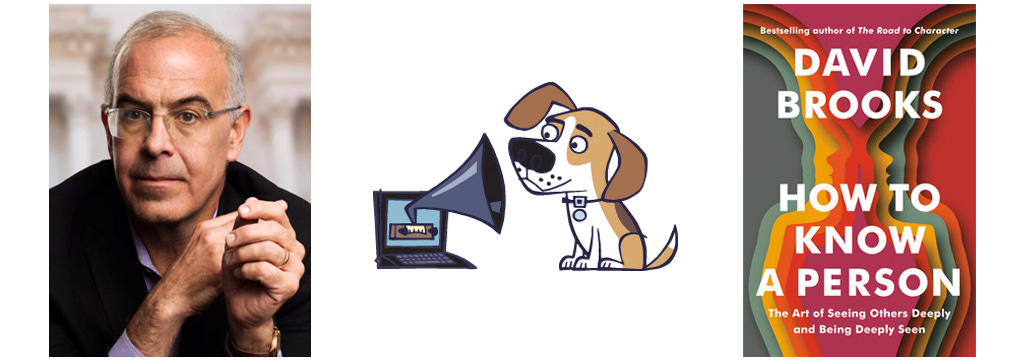David is a long-time columnist for the New York Times. He’s also a commentator on “PBS NewsHour,” NPR’s “All Things Considered” and NBC’s “Meet the Press.” Plus he teaches at Yale. His new book is How to Know a Person: The Art of Seeing Others Deeply and Being Deeply Seen.
You can listen to the episode right away in the audio player above (or on the right side of the player, click “Listen On” to add the Dishcast feed to your favorite podcast app). For two clips of our convo — on how to be a better friend to suffering loved ones, and how loneliness leads to authoritarianism — pop over to our YouTube page.
Other topics: his upbringing in Greenwich Village among intellectuals and gays; his beatnik Jewish parents; his father the NYU professor and his mother with a PhD from Columbia; “not the most emotionally intimate” family; how people shouldn’t separate thinking from emotions; the French Enlightenment; Jungian/Burkean conservatism; Hume; nationalism and King Charles III; Orwell’s “The Lion and the Unicorn”; Disraeli; conservatism and the current GOP as a nihilist cult; Isaiah Berlin; how you’re an “illuminator” or “diminisher” when meeting new people; how most don’t ask questions and instead broadcast themselves; Trump; how Trump supporters are “hard to hate up close”; Hamas and Israel; Hannah Arendt; how to encounter a super woke person; arguments as a form of respect; suppressing your ego for better conversations; Taylor Swift on narcissism; suicidal friends; the distortion of reality when depressed; the AIDS crisis and losing friends; marriage equality; one changing in midlife; Oakeshott; overprotective parents; the value of play; Gen Z’s low social trust; boys growing up with poor flirting skills; casual dating and ghosting; the historical amnesia and unhappiness of young gays; the tension between individualism and belonging; extroverts vs. introverts; how Jesus disarmed people; and the loving kindness of Buddhism.
Browse the Dishcast archive for another convo you might enjoy (the first 102 episodes are free in their entirety — subscribe to get everything else). Coming up: David Leonhardt on his new book about the American Dream, NYT columnist Pamela Paul, and the authors of Where Have All the Democrats Gone? — John Judis and Ruy Teixeira. Later on: Cat Bohannon and McKay Coppins. Please send any guest recs, pod dissent and other comments to dish@andrewsullivan.com.
On last week’s episode with Spencer Klavan, a new subscriber writes:
I’ve been a free subscriber for years — it was the Spencer interview that did it; I just had to hear the whole thing.
My daughter has been identifying as a boy for four years, and in the past year — amid a secondary crisis triggered by gender — she found the church (C of E). Having declared herself an atheist at age 5, she now at 17 attends church regularly and considers herself a Christian. I am concerned because the C of E seems pretty into gender ideology, but the routine and the new ways of thinking have been a great comfort for her.
I am going to buy Spencer’s book and give it to her (and also read it). The grip of gender is loosening, and I think she will find his views on the body very illuminating.
Here’s a “long-time listener, first-time sending comments”:
Spencer was certainly interesting, though I’m afraid he did not successfully convince me of anything. To the contrary I think he just made me more resolute in my own preexisting beliefs.
One: Maybe there is a god or higher power of some sort, but if there is, it’s probably nothing humans could comprehend. And it’s just as likely that there is nothing. That doesn’t make life meaningless or materialistic, as Spencer suggests. Making the world a better place is something we have the power to do ourselves. I think we can find meaning and purpose in without a need for a higher power.
Two: He seemed rather insistent on the Nicene Creed. Sure this is important to most Christians, but I don’t get how its crucial for belief in God? The two should be separate. One can believe in God (or gods) but reject the creed. One can appreciate the teachings of Jesus without believing that he’s the son of God or that he rose from the dead.
Three: Seems like he had some issue with environmentalists — again, why? Even from his own religious perspective, the Bible did make it clear that man was meant to care for the earth, not destroy it. I personally find a lot my personal meaning in life in the beauty of nature. Sure, some environmentalists go into doomsday beliefs — but so do some Christians. I’m an environmentalist because I want my descendants to have a good life, not because I hate people or worship death or anything that Spencer suggests.
Still, it was definitely an interesting listen. As you probably guessed, I’m not a Christian; I'm somewhere on the agnostic-atheist spectrum.
Everyone is welcome here. Another writes, “Spencer’s learning and talents are awe-inspiring”:
But I disagreed with his statement that the Gospels are Greek translations of the Aramaic, which he alleged that Jesus spoke exclusively. That Jesus only spoke Aramaic is hypothesis, not fact. That Jesus may have also taught in koine Greek is also a possibility, based on language studies of the period.
Spencer said that the sayings of Jesus are once removed from his actual words spoken in Aramaic; that we no longer have direct access to it. But by the time Jesus was born, Palestine had been dominated by Greek speakers for 300 years. Greek was a lingua franca there. Jesus lived near Sepphoris, a new Greek-speaking city just a few miles from Nazareth. All Bible verses quoted in the New Testament are from the Septuagint, a Greek translation of the Hebrew Bible, produced close to 246 BCE. Many of the places Jesus visited, including Jerusalem, had Greek-speaking people living there — individuals who challenged and argued with him.
As people in countries where two languages are spoken — like in Hispanic homes in America, where people may speak Spanish at home and English at work; or in Montreal, where people speak English at home and French at work — this may have been the case for Jesus. The idea that Jesus was simply an ignorant peasant, whose divine incarnation made all his ideas, theology, and parables possible, who could not read or write — that is an interpretation of the Gospels I reject.
I recently read a 2015 book titled, Did Jesus Speak Greek?: The Emerging Evidence of Greek Dominance in First-Century Palestine. The author, G. Scott Gleaves, provides evidence that Jesus may have spoken Greek to Greek-speaking audiences, whose words were then transmitted by the writers of the Gospels. (Gleaves even suggests that possibly James, the brother of Jesus, wrote the epistle that bears his name — a concept most modern Bible scholars reject.) Once the idea is introduced that Jesus spoke Greek and was literate, one begins to see the Gospels differently, and in a way that restores their authenticity and power.
I’m a gay man, so I especially sympathize with Spencer’s struggle to feel as though Jesus accepts him even with the compromises that gay male Christians make to get basic needs met for a relationship, while also following the essence of the teachings of Jesus and the Apostle Paul. It’s hard and confusing but worthwhile, in most cases. I appreciated your comment that gay people who are Christians must think more deeply about themselves and their sexual choices than straight people do.
Another asks, “Did you know that Spencer Klavan is Caitlin Flanagan’s nephew?” Yep, and she joined the Dishcast three years ago. Another listener on the Spencer pod:
You commented and asked at 1:06:09: “And we have somehow evolved to develop this intelligence that enable us to do things that other creatures never have. But we are a function of evolution, and natural law as Aquinas and Aristotle understood it — and they thought they were describing reality — is not true. So don’t we have to junk it?”
Spencer described “two ways to go about it.” One way is to junk evolution, which he added isn’t his idea. The other way is to see evolution as being a “physical occurrence to the outworking of a higher purpose.” I am unconvinced, from the ensuing conversation, that framing evolution within a higher purpose saves natural law. Wanting something or needing something doesn’t make it true.
Thomas Aquinas seemed to junk natural law. He abandoned his magnum opus, the Summa Theologica, a few months before he died. He abandoned it following an ecstatic experience. When he was implored to continue working on it, he replied, “I can do no more; such things have been revealed to me that all I have written seems to me as so much straw.”
One more comment on this convo:
Following the Big Bang, the Universe underwent a rapid evolution. In mere seconds, the fundamental building blocks of matter, the elementary particles, came into existence. It was made possible by the irreversible flow of time. It’s important to recognize that the irreversibility of time played a pivotal role in facilitating the Universe’s development. Were time reversible, the Universe would be trapped in a perpetual state of formation and dissolution, resulting in eternal instability and chaos. Hence, the directional trajectory of the Universe’s evolution imparts a sense of purpose to its existence.
Isn’t it truly astonishing that the Universe, seemingly emerging from nothingness, carries an inherent purpose? This sense of purpose extends to encompass both the living and nonliving realms. In this perspective, Darwinian evolution transcends mere random gene recombination; it reveals itself as a purposeful force. Can a random event have a purpose? Not in our experience. The notion of purpose invariably invokes the concept of an a priori desire, a dream, or even a plan. In essence, it suggests that an idea preceded the actions that shaped our Universe.
Gonna ponder that for a bit. This next listener reflects on our episodes with Ian Buruma and others:
You and people like Buruma need to get over the notion that Biden is “decent.” Compared to Trump, yes, but isn’t that a really low bar? Biden is a chronic liar and fantasist. He has backed government anti-disinformation campaigns, which is chilling. His appointees, such Lina Khan and Ketanji Brown Jackson, are not inspiring. He has been an unequivocal supporter of gender change for minors and attacks any challenge to what is often called CRT.
On immigration, he’s a disaster. On crime, he reminds me of Alfred P Newman — “What, me worry?” On economic policy: protection and crony capitalism and — surprise! — inflation. But he’s decent when not facilitating his son’s business dealings (where he may have done nothing illegal but he has clearly lied about not knowing anything). Even the blue-collar Joe from Scranton routine is BS.
(By the way, your talk with Vivek was excellent; I have my doubts, but he’d be better than either of these two ridiculous old men as frontrunners.)
On Ukraine, Buruma saying that what happens next should be up to the Ukrainians is nonsense. We are paying for this war, so we have some say. I despise Putin and support Ukraine, but no, it’s not all up to them, unless they want to go it alone. (By the way, when you talked to Cathy Young, you may have slandered Solzhenitsyn to some degree by saying it’s clear he would have backed this war.)
Finally, your best episode was with John Gray. I love reading him, and I subscribe to The New Statesman mostly for him.
I should ask him back, shouldn’t I? Here’s a guest recommendation of sorts:
A few years ago when we had our national “reckoning,” I decided to figure out what I thought about all this. Luckily, I found Jamaican sociologist and philosopher Orlando Patterson’s Freedom in the Making of Western Culture. (That led me to David Brion Davis and others.) I learned that you can’t talk about freedom without talking about slavery, and for Patterson, the Greeks were the ones who saw that. I’m not suggesting a conversation with him, because he’s quite old and probably unavailable, but I just want to recommend to whoever cares that it’s the greatest defense of maintaining the classics in education I’ve ever read.
On to more debate over the war in the Middle East, a reader quotes me:
“The attempt to immiserate and intimidate the inhabitants of the West Bank, along with settlement of Jewish fanatics there, is a form of ethnic cleansing.” I was reading carefully to be sure this was a statement from you rather than a quote from some liberal in the nature of “trans genocide” assertions.
I don’t care for the more hardliner Israeli polices; they are wearing and they exacerbate the conflict. Land being the number one complaint among Palestinians, Israel ought to have been extremely careful to avoid the slightest further encroachment. At the same time, I think “ethnic cleansing” is much too strong a phrase — just polemic language. It’s about territory, pure and simple. The last thing this conflict needs is more hyperbolic language. I try and maintain my center of gravity and keep balance and nuance, but stuff like this starts to push me over the edge.
Muslim nations are shit-shows. They have zero moral authority. Jokes. Nobody holds them to any standards of behavior, unlike Israel, because we know it is hopeless. Even the innocent Palestinians — pawns of their extremists and other Arab nations — are partly to blame for their situation, having refused all attempts at peace and refusing to make their enclaves useful, instead preferring victimhood. My Jewish ancestors left lands where Jews were persecuted and bettered their lot by coming to free America. And me, I’d welcome emigration by Palestinians to the US — except there would be no way to screen out troublemakers.
If your goal were mere control of territory, you’d need troops, not settlers. There is no conceivable rationale for the settlers except demographic change that will make the lives of Palestinians even more unbearable than they already are. I’m sorry but I’m tired of not stating the obvious. I have no doubt that Israel will be facilitating population transfers out of the West Bank in my lifetime. Ministers in Netanyahu’s cabinet have said so explicitly. Everything points to that conclusion.
Another dissent:
I think your complaints about the NYT’s coverage of the Gaza explosion are frankly ridiculous.
Listen to this episode with a 7-day free trial
Subscribe to The Weekly Dish to listen to this post and get 7 days of free access to the full post archives.












